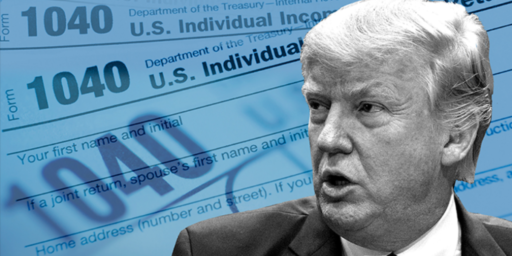Tales of the Tax Code
One of the problems, I think, with debates over taxes, is that we have them as if people actually universally pay taxes according to whatever their top marginal rate is (not to mention that most people do not understand marginal rates as a concept).
Another example of that which is paid is not what one would assume from just knowing what tax rates are comes from Bruce Bartlett:
According to newly released data from the Internal Revenue Service, the number of tax filers with no federal income tax liability among those with an income of $200,000 or more has risen to more than 20,000, just over half of 1 percent of all those with an income over $200,000. In 2009, about four million returns listed such an income out of 140 million total returns.
Also:
The data also show that among those with an income over $200,000, many paid relatively low tax rates: 3.3 percent paid less than 10 percent, 10 percent paid 10 to 15 percent, 37.2 percent paid 15 to 20 percent, 30.4 percent paid 20 to 25 percent and 16.7 percent paid 25 to 30 percent. Just 2.4 percent paid more than 30 percent.
What this underscores is the complexity of the tax code and why it is difficult to have basic debates over tax rates.






I don’t believe it’s possible to have a productive debate on taxation and reform until the process is properly understood as a monetary operation rather than fiscal. You can’t address quality of a policy if the discussion is stuck on quantity and erroneous “who should pay” arguments. Failure to understand the fundamentals is exactly why the tax code is such a mess.
I have this question: can I deduct the price of a personal computer if I use it some concerning my work? How much of the price can I deduct – some, all?
Can I deduct laser eye surgery? I am very nearsighted.
@Racehorse:
Per irs.gov
The acquisition cost of a computer purchased for business use:
Can be expensed under Code section 179, if qualified, by electing to recover all or part of the cost up to a dollar limit, by deducting the cost in the year you place the computer in service, and, if there is any remaining cost, it is depreciated over 5 years.
Can be depreciated over a 5-year recovery period, if it is decided not to expense any of the cost under section 179.
May be eligible for a 100-percent special depreciation allowance if the computer meets certain conditions, instead of recovering the cost through the section 179 deduction and/or depreciation.
Got that?